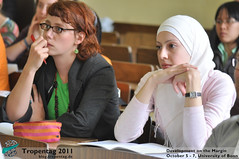sustainable agriculture
Do not miss: Call for innovative technology in Asia.
Sun, 09/23/2012 - 14:56 — De-Registered User
The Innovation Network for Food Security and Poverty Reduction(SATNETasia), funded by the European Union, strengthen the south-south dialogue and promotes sustainable agricultural technologies.
“SATNETasia is still looking for promising innovations, do not hesitate to contact” says Simone Kriesemer at the oral session titled "knowledge, learning and extension", Tropentag 2012. In this research program, scientists develop a framework to identify agricultural innovations that are sustainable, productivity enhancing, and suitable to the poorest.
The research program evaluates technologies based on an analytical hierarchy process. Multiple criteria categorized into environment, economy, society, and technology composes this decision making tool. For assessment of relevant technologies, one indicator, the composite sustainability development index, is calculated out of the evaluated criteria.
The index enables selection of best innovation according to the overall objective (i.e. a sustainable technology). Relevant technology are to be promoted by means of fact sheets and creation of a data base.
Food and the Arab Awakening
Thu, 10/06/2011 - 16:42 — De-Registered User The capacity to produce sufficient and healthy food to feed its population has become a central issue in most of the middle and low income nations. Food insecurity and poverty go together in most cases. The poor are also the vulnerable. In a study conducted in the highlands of Ethiopia, it was found that the variables (such as education level, age, etc) that play a significant factor in leading to poverty where different from those affecting vulnerability. Nevertheless, the most vulnerable are those caught in the vicious circle of poverty. It was inferred from a research conducted in Tajikistan that the heterogeneity of the effect of food crisis across different household segments (like rural, urban etc) needs to be considered at policy level to create solutions that truly have an impact.
Agricultural Development – The Poverty Exit Strategy
The capacity to produce sufficient and healthy food to feed its population has become a central issue in most of the middle and low income nations. Food insecurity and poverty go together in most cases. The poor are also the vulnerable. In a study conducted in the highlands of Ethiopia, it was found that the variables (such as education level, age, etc) that play a significant factor in leading to poverty where different from those affecting vulnerability. Nevertheless, the most vulnerable are those caught in the vicious circle of poverty. It was inferred from a research conducted in Tajikistan that the heterogeneity of the effect of food crisis across different household segments (like rural, urban etc) needs to be considered at policy level to create solutions that truly have an impact.
Agricultural Development – The Poverty Exit Strategy
Oral Presentations III: Mixed Cropping, Agroforestry, and Biofuels
Thu, 09/16/2010 - 11:33 — De-Registered User
This is a sample of some of the great mixed cropping, agroforestry and biofuels oral presentations at Tropentag
Strategies to Use Biofuel Value Chain Potential in Sub-saharan Africa to Respond to Global Change Enhancing Low-productivity Farming in Tanzania and Linking to SMEs – Stefan Sieber
Some of the most significant global drivers stem from energy demands. This study examined new strategies to improve value chains and biofuel potential in order to provide communities in Sub-Saharan Africa with multiple energy services. The study took place in Tanzania, however global applications of the findings was one of the overall objectives.
One way to improve energy demands in developing countries is though linking small scale farmers with small- to medium-scale enterprises. This research project worked with stakeholders in order to develop feasible strategies to maximize profit.
The output from this collaborative effort was the development of global scenarios (applications in other countries), biomass production, consumption patterns, as well as a participatory biomass value chain. The objective of the research was to conduct a sustainability impact analysis and an information system for policy/decision support.




